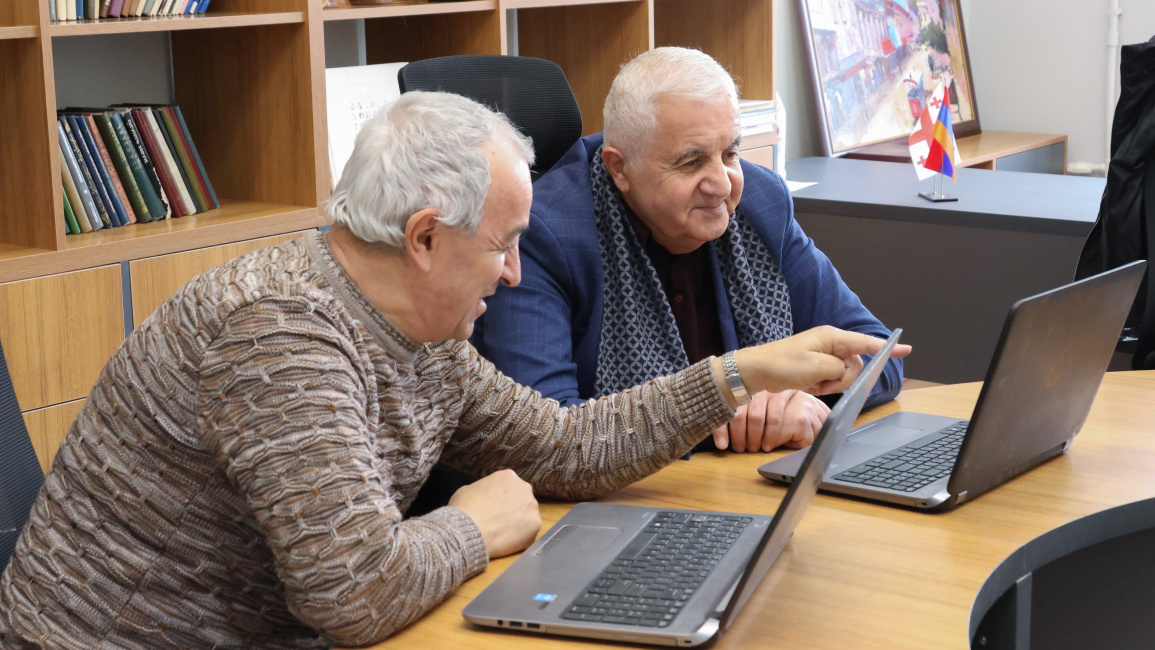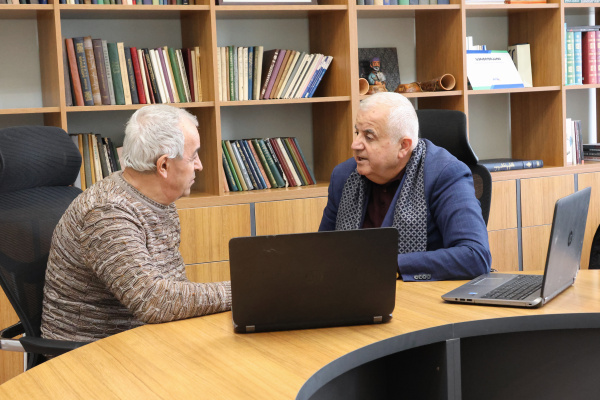December 13, 2024 | 11:00
Society
Research
Publications and scientific journals
Causes of Armenian migrations and displacements central to new scientific investigation
Professors Hakob Harutyunyan and Haykaz Hovhannisyan from YSU Faculty of History are researching Armenian migrations and displacements. Together with their research team, they aim to uncover the causes and historical circumstances of these migrations, as well as to explore why once-thriving Armenian communities gradually "faded", and why many Armenians in these communities chose the path of assimilation with the local people.

The historical analysis titled "Armenian Migrations and Displacements", presented by professors from YSU Faculty of History, has been selected for funding in the "Research in Social Sciences, Armenian Studies, and Humanities 2024" competition announced by the Higher Education and Science Committee of the Ministry of Education, Science, Culture, and Sports of the Republic of Armenia.
Professor Haykaz Hovhannisyan from the Chair of Armenian History presented the objectives and expectations of thoroughly studying history and uncovering undiscovered aspects.
The Importance of Uncovering the Survival and Causes of Assimilation in Armenian Refugee Settlements
In September 2023, another tragic event occurred in the life of the Armenian people: the Armenians of Artsakh were forced to migrate, causing a significant portion of the Armenian population to be displaced once again. This displacement and migration represent deep injustices suffered by the Armenian people, and such a reality should not be met with indifference by the world, especially by those who carry the Armenian historical consciousness.
This grave tragedy that befell the Armenians of Artsakh compels us to reevaluate our historical perspective and assessments, both past and present, as well as the provisions and conclusions embedded in our historiography.
The task of the research team is not to simply recount the history of Armenian migrations and displacements, but to uncover and analyze the factors behind their survival, the reasons for these migrations and preceding displacements, and the processes of their current assimilation—moving beyond textbook narratives and theoretical issues.
The Need for New Scientific Studies in the Face of New Challenges
The emergence of Armenian refugee settlements and the history of the Armenian diaspora after the 1915 events have certainly become subjects of study for Armenian historians. There are works dedicated to the history of specific Armenian refugee settlements as well as studies that summarize this history, contributing to filling the gaps in historiography over time. However, the scholars note that these studies mainly focus on the internal life, economic, and cultural issues in Armenian refugee settlements.
During the Soviet period, a significant amount of literature on the history of Armenian refugee settlements and the diaspora was published, mostly concerning areas of the former USSR, such as Crimea, Astrakhan, Rostov-on-Don, Moscow, St. Petersburg, and others.
While highly appreciating the work of the historians, the research team nevertheless notes that the theses established during the Soviet era no longer align with the current challenges facing the Armenian people.
The recent events in Artsakh impose a renewed demand on historians to investigate and analyze the causes and consequences of these continuing tragic situations in the life of the Armenian people, in the hope of preventing similar tragedies in the future.
The research team will try to uncover where the Armenian people have faltered or been unable to resist these calamities, and whether there are any vulnerable points in our path to survival and perpetuation.
The "Fading" of Armenian Refugee Settlements as a Subject of Study
It is crucial to uncover the reasons why Armenian refugee settlements gradually "faded" or, in some cases, disappeared altogether, why some Armenians chose the path of assimilation with local populations, and why others could not withstand the economic competition of local people. The research team believes that answers to these questions are either lacking or insufficient in our historiographical literature.

The team will examine the history of Armenian migrations and forced displacements, analyzing past and present realities, and based on this analysis, propose solutions that would be acceptable to the Armenian people.
The study will not be limited to the historical and existential issues of the Armenian people. A comparative analysis will also be conducted on the history of foreign communities living in Armenia today (including those inhabiting the territories of Greater Armenia, such as Greek, Jewish, Assyrian, Kurdish (Yezidi), Russian, and others). The study will address their existential and religious issues.
The research team will examine the impact of political, economic, doctrinal, and cultural geopolitical factors on the weakening, dissolution, and displacement of Armenian communities, including those subjected to genocide.
The research team will discuss the impact of political-economic, doctrinal, and cultural geopolitical factors on the weakening, decline, and displacement (including those leading to genocide) of Armenian refugee settlements and communities.
Analysis of Contradictory Facts – Within the Scope of the Research Group's Examination
The research will apply methods of content analysis widely used in contemporary science, as well as various methods for critical analysis of archival materials, diverse testimonies, and information. In the study of primary sources and archival documents, the research team will be committed to applying a critical approach, comparing and analyzing diverse and sometimes contradictory facts and viewpoints. The methodological foundation of the research is based on the principle of historicism, ensuring consistent adherence to the chronological sequence of historical events. Since the subject of the research concerns exclusively historical issues (social-political, legal, spiritual-cultural, etc.), the study will be carried out based on the investigative examination of archival documents, existing historiographical literature, and press materials.
Dissemination of Research Findings Among the International Scientific Community
The research will last for three years, during which the expected key findings of the research will be published in journals included in internationally renowned scientific databases. The members of the research team will also compile articles for leading Armenian scientific journals and will participate in national and international conferences to present the collected materials.
The research team is led by Doctor of Historical Sciences, Professor Hakob Harutyunyan, with Doctor of Historical Sciences, Professor Haykaz Hovhannisyan as the leading member. The other members of the research team are young historians: graduate of YSU History Faculty, PhD Hratsin Vardanyan, and PhD Eduard Hovhannisyan. The team's international scientific advisor is Professor Vyacheslav Menkovsky from a university in Minsk.

